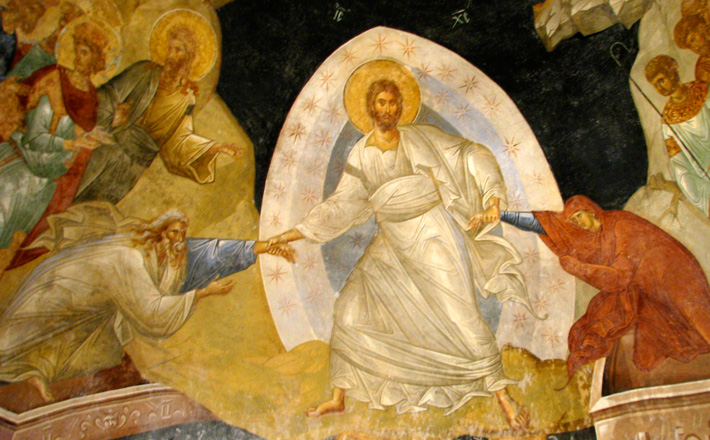Commentary on Luke 20:27-38
Jesus is having another argument.
That is not unusual, especially not in Luke, where he has been arguing at least since he was nearly at the age of bar mitzvah and he stayed behind in the Temple to argue with the teachers. This argument, like all the others, is an argument about Torah. This also is not surprising since there is very little more important, or enjoyable, to argue about, particularly given that Luke has established Jesus as a Torah-observant Jew, concerned for the traditions of the ancestors.
His mother will have been pleased. She probably sang to him the lullaby that I know in Yiddish: “This is the best sehora/My baby will learn Torah.” (I first found this lullaby in Leon Uris’s Mila 18.) You know the argument is a Torah argument because the people who pose the argument begin by saying: “Teacher, Moses wrote for us…” With that, the contest is joined.
This contest, however, is different. In earlier arguments Jesus and his conversation partners go back and forth. They ask a question, and Jesus asks another. Sometimes they reply with yet another question, and Jesus sometimes even continues the questioning further. The extended discussion in chapter 10, which contains the parable of the Good Samaritan, is an excellent example of this. This contest is quite different, and the difference shows immediately.
For the first and only time (at least in the gospel of Luke) Jesus argues with Sadducees. And the Sadducees, despite all their accomplishments and activities, are identified not in terms of what they have done, or what they believe, but only in terms of what they deny. They are anti-resurrection, and this, as Jacob Jervell points out, puts them outside (as far as Luke is concerned) of the family of Israel (see his discussion of resurrection as an ancient identity marker for what became formative Judaism in his Apostelgeschichte). Of course, the Sadducees were Jewish, but some Pharisees (and some Christians like Luke) did not think so. And all because of the importance of resurrection.
Why would resurrection be so important to Pharisees and other Jews? Part of it is the matter of which books in the Bible are considered to be inspired by God. The Sadducees worked only with the Pentateuch, the Torah, while the Pharisees and others read also the Prophets and Psalms as scripture, and it was in those extra books that Pharisees found justification for trusting in a resurrection of the dead. But this sounds too simply like a denominational fight, a tempest in a theological teapot, and therefore hardly worth anyone’s time to report.
Far more important was the matter of the ultimate justice of the world. The Sadducees understood this world to be the only world in which God would act as a keeper of covenantal promises; Pharisees understood that God would keep promises and enact justice even (maybe even particularly) beyond the boundaries of this world, which was a good (and necessary) thing because Rome quite clearly controlled this one and was clearly not going to be paid back for its injustices.
This appears to matter for Luke both because he is telling the story of Jesus, who was killed by the Romans, and because he is telling his story (in the form we now possess) around the year 100 of the Common Era (CE). He is, therefore, telling his story of the Roman abuse of power to audiences who remember Rome’s crushing of the First Jewish Revolt (66-70 CE) and Rome’s destruction of Jerusalem and the Temple.
Some ancient sources set the Jewish death toll in that defeat at around one million. That is surely too high, but the defeat was devastating, and I can understand why Luke would insist that it would take a general resurrection of the dead for accounts to be properly balanced. Rome held this world under its brutal power, and Luke was not willing (nor were the Pharisees, nor was Jesus) to let Rome have the last word when it came to God’s Creation and God’s promises.
In the scene from Luke 20, the Sadducees (those deniers of God’s ultimate justice) approach Jesus with a case meant to make resurrection look ridiculous. Jesus brushes them off with a theological shrug that simply rejects the premise of their case, and they vanish. In the next scene, some scribes (presumably Pharisees, surely believers in both justice and resurrection) appear and warmly approve of Jesus’ argumentative finesse, and with that, all questioning ends. Jesus has won the approval of those Jews who expect the most from God.
The terms of Jesus’ argument are worth a closer look. He has been handed a case involving the complexities of levirate marriage, that patriarchal institution that protected women by passing them from brother to brother. Jesus says that in the aeon to come, the aeon of resurrection and restitution, the whole institution of marriage will be unnecessary, and thus women will not be passed along as property. Why? Because, as Jesus says in Luke 20:36, in that aeon, people “are not able to die.” Why would that matter? It appears that Luke’s Jesus understands the aeon of resurrection and restitution to have set aside the entire patriarchal structure that makes the possessing of women as property possible or (perhaps) necessary because of our mortal weakness.
In the movie, Ever After, the prince arrives (too late) to rescue Danielle (the Cinderella character) from the villain who had bought her intending to make her a slave and a wife, in that order. Danielle, who had already freed herself through the skillful use of intellect and sword, asks the prince what he might be doing. He answers that he had come to rescue her. When my daughter was young, this was her favorite scene in her favorite movie. I just loved watching her watch the movie. I loved watching her learn that she also possessed the strength and intellect to stand up for herself. I also prayed as I watched that this strength would never be crushed.
In this scene from Luke’s story, Jesus prays with me, and waits with all faithful people for a world in which justice will not be a crude compromise or a commodity to be bought by those with expensive attorneys, a world in which life will rise out of the ashes of crushed hopes and dreams.


November 10, 2013